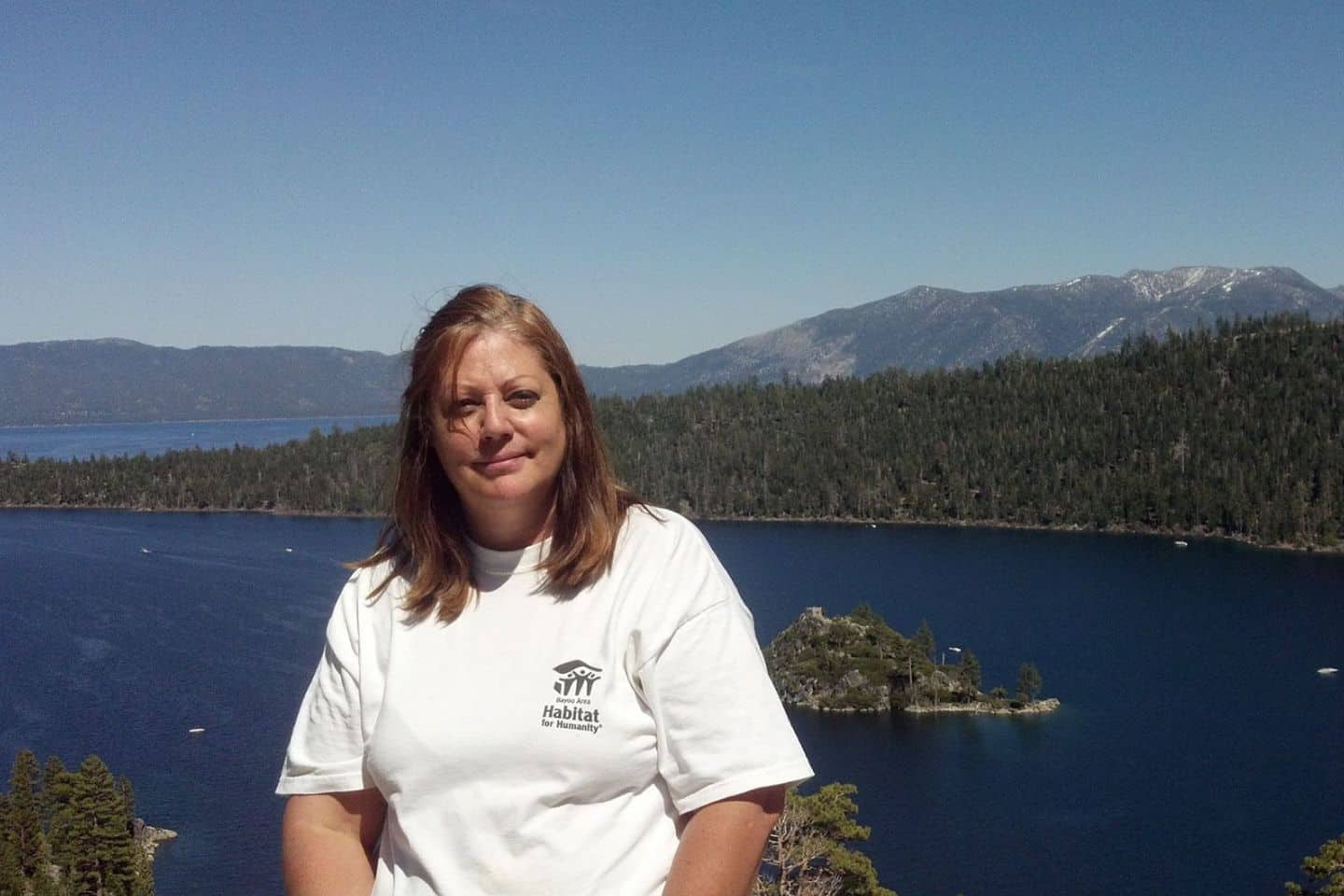
Have you ever had one of those moments at work when your boss pushed your buttons, and you were tempted to quit on the spot? Or when you got tired of the usual grind and wanted to just take off and travel full-time? Lisa Crawford, an Air Force retiree, did both of those things within a matter of weeks!
In 2012, Lisa left her government contracting job, packed up her RV, and set out to travel the U.S. While chronicling her journey on her blog, Lisa’s Living Her Dream, Lisa spent nearly 3 years roaming the country in her RV, volunteering, and making new friends along the way.
Then she started a new life yet again, this time moving to Malta and traveling extensively throughout Europe.
In the first of a two-part interview series, Lisa explains how she (unexpectedly) came to be fully retired at the age of 50 and tells us about full-time RV living with a dog, a cat, and two birds.
(Here is Part 2, the story of how Lisa got residence visas in two European countries!)
What year did you retire from the military and what did you do immediately afterwards?
I retired from the Air Force as a MSgt in 2010, after 28 years. I was living in the DC area and took a contracting job with DynCorp.
What prompted you to quit your job and travel in your RV full-time? How long did you think about and plan for that change?
My long-term goal was to work for 5 years, pay off all debt, and save enough money to buy an RV to travel around the U.S. I got the idea from my Mom, who did the same thing.
In 2011 Hurricane Irene and Tropical Storm Lee hit within about a week of each other. The resulting rain caused massive flooding, including my apartment complex in Alexandria, Virginia. My car and furniture were all lost, but the water in my apartment was only about 8″ deep, so I was able to save most of my belongings. I packed them in a storage unit.
As I sat in a hotel and contemplated my next move, I decided to look on the bright side. Instead of waiting 5 years, I could move the timeline up if I bought the RV now. It would certainly be cheaper living in my RV, and I could have it paid off by the time I was ready to really retire.
So, I bought a brand-new Dodge Ram 2500 and a 34-foot Forest River Wildcat 5th wheel, and I found an RV park nearby.
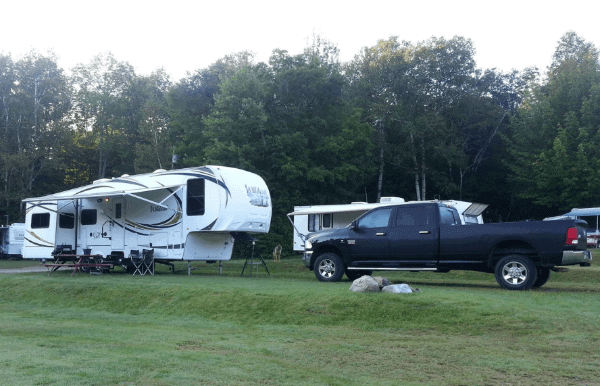
Meanwhile, I loved my job and had great senior leaders, but my immediate supervisor . . . not so much.
One day he just pushed my buttons one too many times. I told him: “You know what? You’re an ass, and I don’t have to work for you anymore. I quit.”
I cannot tell you how liberating that was! I fully recommend everyone do it once in their life!
I literally went home, hooked up my RV, and hit the road 2 weeks later. My travel buddies were my 16-year-old Maltese poodle mix named Brutus Beefcake, my cat, Sammie, and two cockatiels. All excellent travelers, as it turned out.
When you set off, did you plan to travel indefinitely, or were you planning to come back to “regular life” at some point?
I had every intention of taking the summer off, and then coming back and finding another job. I still had quite a bit of debt, including the brand-new truck and RV. Plan A was still to work until I was debt free.
As far as RVing after retirement, I figured I’d do that as long as I wanted, then see what came next. I’ve never been a big planner. Rather, I just make an impulsive decision and go with it. If it doesn’t work out, I change direction.
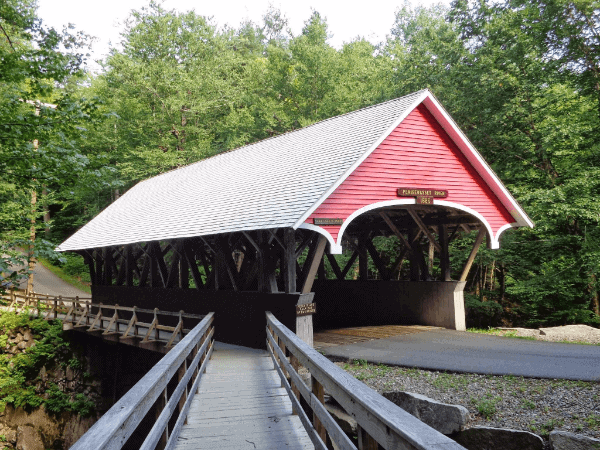
I will say, I’ve been that way my whole life, with big and small decisions, and I have never made a decision I regret. Of course, like everyone, some decisions turn out to be wrong, but that could happen with the most careful plans and agonizing over what to do; I just skip that part!
Tell me about the logistics of packing up your life in Virginia. What did it involve, and what were some of the challenges?
In terms of logistics, there really were none (another benefit of the flood).
I went through my storage unit and donated almost everything that I couldn’t fit in my RV. I used a mail forwarding service in Florida called American Home Base. I have TRICARE Select, so my medical needs were covered.
What was your financial plan? Did you create a full-time RV budget?
In terms of a financial plan or budget, I’ve never really had either. I save a little, pay bills first, and if there is any left over, it’s mine.
Full time RV living, I was to find out, was VERY expensive. My original plan was to start out debt free. Like most things, that changed, and it was what it was.
I knew I didn’t want a real job, so I turned to volunteering. Mind you, I had my retirement and a 60% disability rating, so I had some money coming in.
There are a limitless number of ways to get free RV hookups; volunteering about 20 hours a week at campgrounds or State or National parks is just one. I spent 3 months in the Stanislaus National Forest and 3 months volunteering for the Army Corp of Engineers in Mountain Home, Arkansas.
Part way through that first year, you made a big decision related to your finances and retirement plans. What was it?
At one point, I was in California, hiking on the Pacific Crest Trail, when I had an epiphany. I was hiking along when a thought hit me like a bolt of lightning. It occurred to me that I had invested and saved my whole life for retirement. What if I just cashed everything out, paid off all debt and never went back to work?
Let’s face it, going back to my original plan of working and paying off debt would take a few years. Although I was only 50, I was falling apart.
What would my body be like at 55 or 60?
Would I still have the will and/or ability to live my dream of traveling full time?
Would I tie myself down with the inevitable purchase of more stuff?
Life is short, you have to live it.
Let me just say, I paid a heavy penalty for liquidating my investments at 50 years old, but that’s just what I did, and I never looked back!
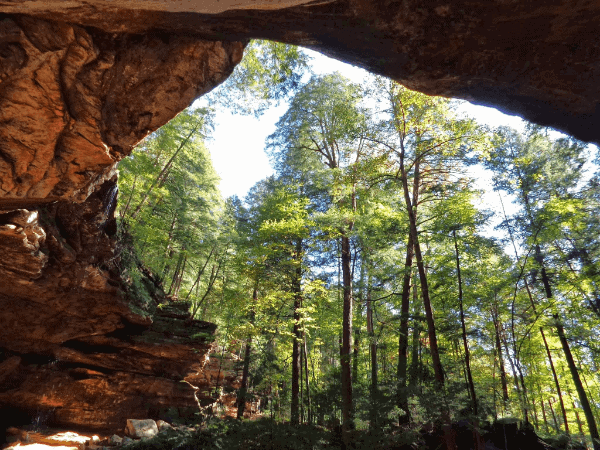
Tell us about your day-to-day life traveling in your RV. How did you spend your time?
It only took a few weeks to realize I was bored. I needed purpose to my life, and I had always done volunteer work.
Habitat for Humanity has a program called Care-A-Vanners, or “CAVs.” Basically, it’s people who travel in an RV to a location and spend 2 weeks building houses. Besides giving me something constructive to do, I got free or reduced RV hookup. The CAV community is awesome; friends for life! As you travel, you not only meet new people, but you see old friends.
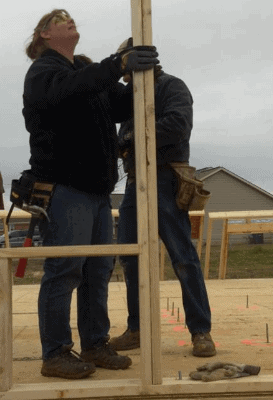
I also got involved in the Forest River Owners Group (FROG). They hold FROG rallies all over the country. RVers as a group are very friendly, so no matter where I went, I found great people. That was one aspect I hadn’t thought of: making friends on the road.
How I spent my time varied. Sometimes I’d spend months building houses. I got to travel the country, but it was often on my way to another build, with little time for exploring.
I usually spent 4 months of winter in Ocala, Florida. When I was there, I did a lot of hiking and biking. Other times, I’d go to a place I’ve never been and camp for 2 or 3 weeks and explore to my heart’s content.
| Related Reading: The Best Hidden Vacation Spots in the U.S.
What people don’t consider is, full-time RV travel isn’t a vacation where you only have 2 weeks to see something, so you have to stay busy. This was my day-to-day life. I might spend a whole day just sitting around watching TV.
Yeah, I know I’m right next to the Grand Canyon, but I have a good satellite signal and I want to relax. If I feel like it, I’ll go see the Grand Canyon tomorrow.
How did RV life compare to what you had envisioned?
I think the only thing that surprised me was the attitude of other RVers towards me as a single woman.
Mostly men, but some women, too, were absolutely dumbfounded that a woman could not only drive a truck pulling an RV, but actually back it into a campsite.
I had quite a repertoire of comebacks, some witty, some sarcastic, and some rude, all depending on the attitude of the commenter.
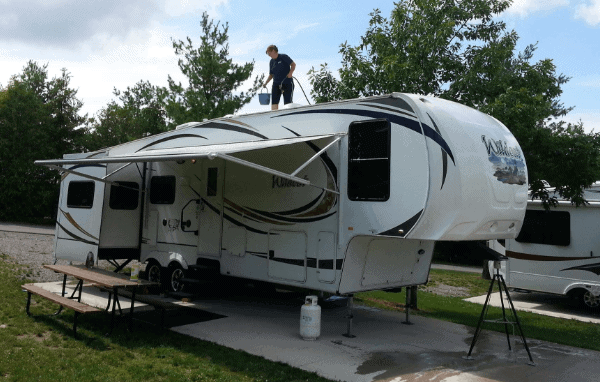
I had quite a few admirers too, which was surprising.
At one rally in Florida, word got out that I was coming. I actually had a group of people hanging around the next campsite, waiting for me. I didn’t think anything of the group and just went about my business. Once I got situated and started setting up, people came to say how cool it was, that a lot of the men didn’t get backed in right on the first try. It’s not a big deal, it just takes practice.
Most people were pretty curious and very friendly, and I can only hope I changed some attitudes along the way.
Was there ever a point when you regretted your decision to transition to RV life?
Never, not even for a second!
What advice would you give a retiree who is thinking about full-time RV travel? Would your advice be different for a single person vs. a couple?
My advice for a couple would be: Ladies, learn to drive and set up the RV on your own!
You never know what happens. What if you’re across the country, and your husband gets sick or injured? You owe it to yourself to develop the confidence to take care of business.
Husbands, you have absolutely no magical skill or ability that your wife doesn’t have just because you’re a man and she’s a woman.
You learned to pull that RV at some point, so can she.
You learned to back it up into a campsite, so can she.
You made plenty of mistakes, but learned from them, so will she.
For single women, don’t EVER tolerate a condescending, presumptuous man who tells you to get out of the truck and let him do it because you can’t. (Plenty of men are happy to show you how, help you, or guide you into a site, these are not the men I’m talking about.)
As mentioned above, you will make mistakes. Like anything else, practice, practice, practice. There are a lot more single lady RVers than you would think, so don’t be afraid!
In general, it’s a wonderful life, because you have the best of both worlds: home and travel.
If money is a problem, there are limitless ways to cut costs. Google “WorkKamping” and you will find thousands of jobs for full time RVers. Volunteer in exchange for free site fees.
Ask questions. Fellow RVers are some of the friendliest people you will ever meet, and people love to share ideas and information. There are countless Facebook pages; they are a great resource.
Use a mail forwarding service. There are plenty, but I use American Home Base in Pensacola Florida. You can have your mail sent to you anytime, anywhere.
For prescriptions, you can use the mail order pharmacy.
Eventually you made a decision to sell the RV and travel abroad. How did that decision come about, and what was your plan for moving overseas?
I was stationed in Germany and Holland in the 80’s and loved it. I always had an idea, in the back of my mind, that I wanted to live there again.
In July 2014, as with most of my ideas, I woke up one morning and decided I was going to sell the RV and move to Europe.
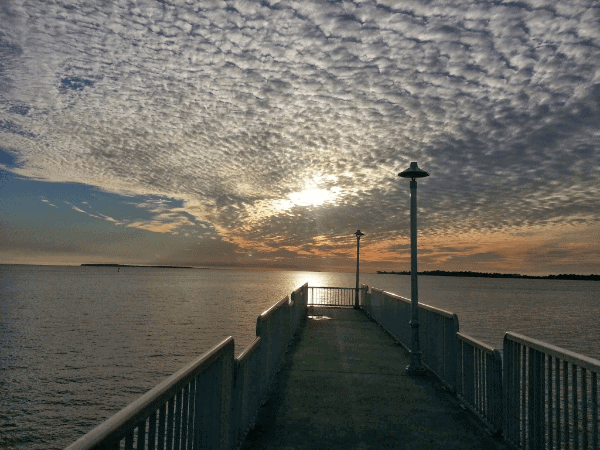
As I mentioned, full-time RVing is very expensive. I figured I’d move abroad and teach English. Extra money would be nice to pay off the debt I had accumulated (my liquidated investments didn’t cover everything). I found a class for teaching English as a second language in November and made that my deadline. I’d sell everything, including my RV and truck, and leave right after.
My cat had died the previous year and I had given the birds to a friend. The dog, I would take with me, but he was 19 by then, and he died about a month before I left.
The big question was where. Since it was November, it would be cold, so I Googled “warm places to retire,” “cheap places to live,” “English classes,” etc. In almost every search, Malta popped up.
“Where the heck is Malta?” I wondered.
A little more Googling and I decided, what the heck, I’ll give that a try.
I intended to just stay for the winter, then either look for a teaching job or just travel, but then I met a man . . . .
Want to read the rest of Lisa’s story? Here’s Part 2!

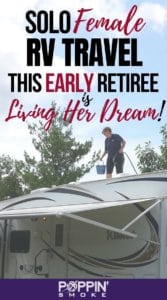
Nice story. My back story is not much different however, I did not buy an RV and begin traveling (not that the thought never crossed my mind). My wife and I liquidated two businesses, the house, two cars and everything else we couldn’t fit into a shipping container and moved to the Philippines. I was 58, she was 53. We built a house there and made it our home. After several years there, we flew to Guam and set up a domicile there for a change of pace and for medical reasons as we age. I have never looked back.